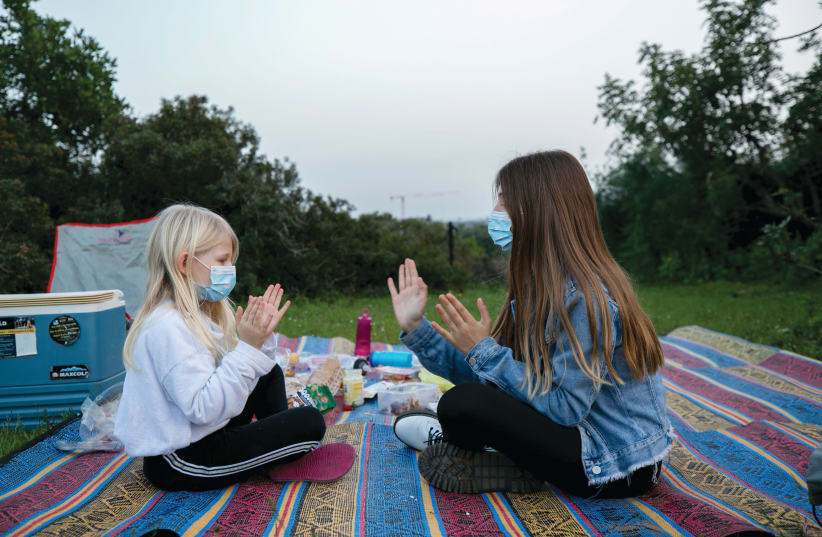Coronavirus has taken over our lives.
“I hate corona,” my eight-year-old said the other day in frustration, as she looked out the window at the park right by our house.
The swings were beckoning her to come and play, and she so desperately wanted to just get out. But it was Shabbat, and too many other kids were playing there at the time – without masks, their parents chatting close to one another.
My children are taught to follow the coronavirus rules – as much as they can keep track of the ever-changing regulations that are handed down from the government through me, usually in a fit of frustration as I try to understand why this now and why that.
There are three tried-and-true directives: wear masks, social distance and wash your hands. I have a sign hanging on my front door reminding the children to wash their hands as soon as they enter the house. Not that they get to leave too much anymore, but just in case.
On the cabinet across from the doorway, I keep a full bottle of antibacterial hand gel and extra masks. In my car and my husband’s car are extra masks – just in case. And when they still had school, my eight-year-old had an entire extra box of masks in the second pocket of her backpack – also, just in case.
On Shabbat dinner, our conversation generally starts like this: “Who can tell us something about their week?”
The children are supposed to say something positive, and they often try. My 13-year-old shared how she is liking Zoom school better this year, her teachers are really organized, and she did great on her last test.
But the situation usually crumbles quickly – often because of me.
When it is my turn, I will share something positive that happened at work. Perhaps I will start out enthusiastically explaining about an interesting interview I had with this or that medical expert. But that will inevitably lead to me explaining something that he or she said about the virus, which will lead me into a diatribe about the more than 8,000 people who were diagnosed with the virus the day before.
Then I will attack how the government is zigzagging its way through the crisis, which has no end in sight. This will lead into how the people are sick of following the government’s chaos, so we are all just going to get sicker.
My 10-year-old will then share how her friends are still hanging out with each other and she wants to know what I think about that. I’ll respond by sending her to wash her hands again and start explaining how kids over 10 get infected and are as contagious as adults. The children roll their eyes; they have heard this speech 100 times.
My husband will ask if there is anything we can talk about that does not center on coronavirus and offer a dvar Torah. Inevitably, the conversation still soon turns back to coronavirus.
When I sleep, I have nightmares about the articles I wrote the day before. Did I make a mistake? I ask myself. What if I translated one of the new directives wrong and all of our readers think that they can do something when they cannot? Or vice versa.
And I will toss and turn, questioning if today’s migraine is really COVID-19. Did I lose my voice because I am tired or it is really coming from my lungs, and I caught coronavirus just from driving to my office and back – which is pretty close to impossible, but I guess you never know.
I am reading the novel The Book Thief by Markus Zusak, a book that my daughter will be required to read in school after Sukkot, because I want to be able to help her with her schoolwork. The novel is written in first person and the narrator is Death.
I read the first 350 pages over Yom Kippur while listening to the Chabad, which is conveniently located under my house, singing the holiday prayers. As the prayer-goers recited the viddui (Yom Kippur confession) and Death described the nearly final breaths of Max Vandenburg, a Jew who was being hidden in the home of a poor family in Germany, I started to cry.
“God,” I asked, “Why? Why do You let your people suffer so much?”
In every generation there is a tragedy – something that rocks the Jewish world and changes it forever such as the Crusades (1095-1492), the Spanish Inquisition (1478-1834), Russian pogroms (1881- into the 1920s), the Holocaust (1933-1945) – and the list goes on.
We can go back even further, of course, and find more examples.
The COVID-19 pandemic is not uniquely Jewish, but the coronavirus death toll has surpassed one million worldwide, and this pandemic is certainly the tragedy of our generation.
Some of the greatest rabbis, scholars, artists and scientists have died from the disease.
It has taken over our lives, altered the way we work, the way we celebrate, the way we pray, the way we learn and even the way we love.
It will not be a temporary shift; we will surface from this pandemic forever changed.
We are now living in the shadow of coronavirus. Let’s hope that God answers our prayers from Rosh Hashanah and Yom Kippur, and that in 5781 there will be a little more sunshine.The writer is news editor and head of online content and strategy for The Jerusalem Post.
